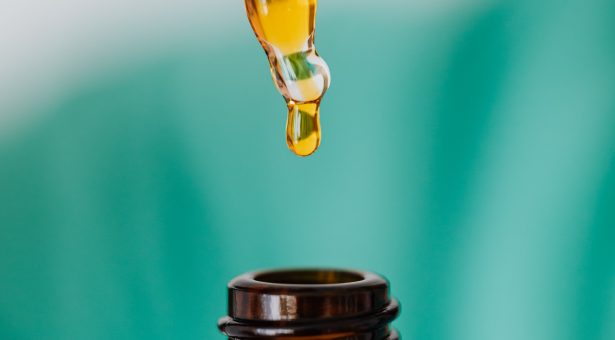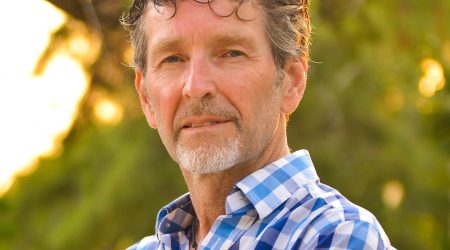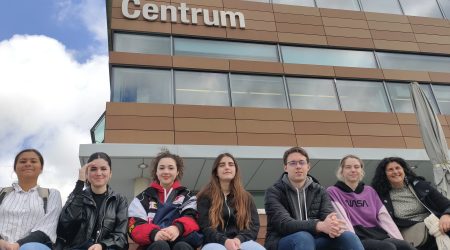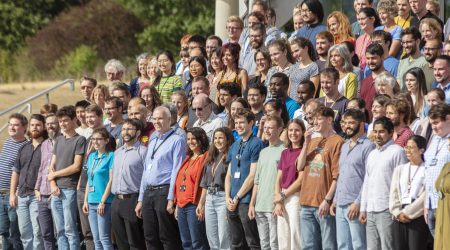Parenting and pipetting; balancing family and lab life

At the John Innes Centre we actively promote a family-friendly and inclusive workplace – recognising that excellence in research is intimately linked with equal opportunities.
To help make this happen, we offer a range of family-friendly initiatives to support staff and students who have responsibilities as a carer alongside their role at the John Innes Centre.
We asked four of our researchers to tell us about their experiences of balancing scientific research with their caring responsibilities.
Dr Xiaoqi Feng – Group Leader
“The John Innes Centre is an ideal place to work for a woman and mother.
I was a tenure-track Group Leader when I had my son, and knowing that my tenure clock would be extended for a year, and that I would have additional resource made the decision to have a child a little easier.
Now as a Group Leader I am responsible for a lab. We work on germline epigenetics, the changes beyond the genetic code that cause heritable phenotypes and I didn’t want the work to grind to a halt while I was away. The Institute’s Project Leader Carer fund was extremely helpful in paying for a Lab Manager to support my lab, cover my role and continue our research for six months while I was on Maternity Leave.
Once I returned to work, the John Innes Centre Family Support Fund has enabled me to attend conferences with my son and partner.
Besides these financial packages, it is incredibly helpful and reassuring to have someone to talk to when there are issues being a working mother. Our Head of Directorate, Dr Carole Thomas is someone our female Group Leaders feel very comfortable to talk to.
As well as being supportive, Carole facilitated the setting up of a Parents and Carers Group, which identifies areas where the John Innes Centre can improve, to make the lives of working parents easier. One of these improvements was the addition of an on-site nursery, which has helped a lot of parents, myself and the Postdocs in my lab included. The Group also provides a network for parents and carers and organises events for families.
There’s no doubt that being a parent and a scientist is a difficult balance, at times I have struggled. My son is now 3 and I think the past three years have been a process of constant adjustment of this balance.
I am lucky that my hobby is my work, but it also means that adjusting my work-life balance had never been an issue before I had a child. Looking back, although the adjustment is difficult, I think my child brought a new balance that has enriched my life both in and out of work.
I am often asked by PhD students and Postdocs about having a child and work-life balance. I think it is important that they know that everyone has their own unique balance point suitable to them, and nowadays in academia this balance is achievable.
I encourage all students and postdocs to look inwards for what they want, and go for it. If difficulties are met, have the courage to work to change the environment. After all, the choice we have today is the result of the numerous people who have worked hard before us.”
Dr Penny Hundleby – Senior Scientist
“Juggling parenthood and a research career certainly hones your ‘time efficiency’ skills.
Prior to parenthood, and especially as a PhD student, it was some time before I knew that the fire alarm system was tested every week at 9am. Now by 9am I am reaching for my second cup of coffee, having already taken two children to two different school Breakfast Club’s, and am making headway through my emails.
Now, I cannot stay at work until I want to leave, I have to plan things carefully to ensure I am on time to collect my children from afterschool club (paid for by salary linked childcare vouchers).
But these time constraints aren’t always a negative. They can help you focus. It was shortly after returning to work after having my first child, that I worked on and was awarded my first grant as the lead, or principle investigator (PI). Using my time efficiently and being driven to succeed was really important as I stepped up into that role.
Over the years the John Innes Centre has offered me flexibility in the hours I work, meaning I have at various times been full-time, on maternity leave and part-time, ranging from reduced hours 5-days a week, to three and now four days a week.
We’re not perfect though. In science, as in all careers, working parents often sacrifice career aspirations for job security and I would like to see a better career structure that recognises career progression of research staff (outside of the classic PhD to Postdoctoral Scientist to Group Leader model).
I am encouraged that this is starting to happen with initiatives such as the Technicians Commitment; which aims to raise the visibility, recognition, sustainability and career development of research staff.
In 2017 I was awarded Chartered Scientist status through the Science Council. Being a registered Chartered Scientist helps me to stay accountable for my own career development and ongoing training.
Investing in ourselves is important, and it is something that can easily slip for working parents with time demands, especially those working part-time.”
Dr Chris Whitewoods – Postdoctoral Scientist
“Flexible working makes it possible to do my job. During my time at the John Innes Centre I have used flexible working almost every single day since my son was born.
My wife and I both commute and to me the trickiest thing about having a child is the loss of flexibility. My wife works in Cambridge, so we live smack bang in between Cambridge and Norwich and both commute in opposite directions. This sounds bad, but we live in the middle of a forest with our two-year-old son and two cats.
We have to coordinate our days carefully, around pick up and drop off at nursery. Our families live far away so anything unexpected can be quite difficult. Luckily, I am able to work flexible hours so this isn’t too much of a problem.
If anything, this experience has helped me plan experiments better.
The John Innes Centre offer Shared Parental Leave, which I took and had three months at home to look after my son, and my wife returned to work. This is one of the best things that I have ever done. I really think more fathers should take this opportunity to be with their children if they can. It was nerve wracking asking my Group Leader for the time off, but he was incredibly supportive and made the whole thing easy.
It’s great that the John Innes Centre offer Shared Parental Leave, the only problem is that it is not paid as well as Maternity Leave, which makes the prospect less attractive. It didn’t stop me, but in the future, I would love to see Shared Parental Leave match Maternity Leave to encourage a more equal sharing of caring responsibilities. I think it will be good for everyone.
The institute also has a policy to consider requests to extend fixed term contracts following parental leave. I applied to this scheme, so my career didn’t suffer at all. Through this period, I was helped massively by my colleagues who were incredibly supportive and helped to look after my plants while I was away.
At the moment, I am a Postdoctoral Scientist in Professor Enrico Coen’s lab where I investigate how plants produce complex shapes. I work on a carnivorous plant called Utricularia gibba, which has hollow cup-shaped leaves that trap small invertebrates. These complex traps evolved from flat leaves and I try to understand how this transition happened and how genes control growth to make such different shapes.
Recently I received a small grant from the John Innes Centre, to help develop my independent research ideas, which I am very grateful for. It is a big opportunity for me to advance my career. I think the more Postdoctoral Scientists who could get this opportunity, the better as it is an investment in the careers of the people who are the future of science.”
Dr Rachel Wells – Senior Scientist
“I am a Brassica geneticist and have been at the John Innes Centre for over 18 years.
In this time I have progressed from being a Masters student to a Research Assistant, then a PhD student, a Postdoctoral Scientist and finally to become a Senior Scientist with the ability to apply for my own grants. Currently, my focus is in developing control solutions for the Cabbage Stem Flea Beetle, a serious pest that currently threatens the viability of the UK rapeseed industry.
The birth of my daughter coincided with the breakdown of my marriage. Now as a separated parent (never single because my daughter’s father plays a big role) life is very much a juggling act. This is true of anyone who has children. It is hard to balance working and parenthood and many of us feel the anxiety of doing neither very well, we are torn between the two roles.
In reality, though we may feel this way, it isn’t true.
It is possible to have children and work in academia. I think we just set the bar very high for ourselves and do not make allowances for those two very different roles.
At work I do everything I used to do, it just takes a little more organisation. I am an associate editor for Plant Cell Reports and editorial board member for Oil Crop Science, plus I sit on the BCPC Pests and Beneficials expert working group. I am the project manager on the £4.4million BBSRC sLOLA Brassica Vegetable and Rapeseed Optimisation (BRAVO). In short, I am busy.
The support in place at the John Innes Centre, flexible working and an understanding Line Manager helps me to balance my role as a mother and my career.
Flexible working made it possible for me to return to work when my daughter was six months old. I was able to maximise the amount of work hours I could do while minimising the amount of paid childcare I needed. Luckily, I live close to my child’s grandparents and they provide excellent support too.
The John Innes Centre has a Family/Dependant Support Fund that can be accessed to support travel to conferences. My amazing family support allows me to travel to conferences and meetings without needing to access the fund. But it’s great to know that it is there if I need it.
Childcare vouchers, available through work gave me the opportunity to pay for nursery costs from my salary before tax, saving me some money and, because it was set-up to come out automatically, I never had to remember to put money aside to pay for care. The nursery on the Norwich Research Park made access easy and convenient.”
We’d like to thank Xiaoqi, Penny, Chris and Rachel for sharing their experiences. Their stories have highlighted some of the support mechanisms in place at the John Innes Centre. We offer a range of support, informed by the Parents and Carers Group, to help parents and carers achieve the flexibility they need. This growing list of support ranges from an on-site nursery to regular networking events open to all.
Caring and parenthood is a challenge and achieving a good work-life balance that enables you to be the best parent and researcher you can it is not straightforward, but with support and flexibility it is achievable.



